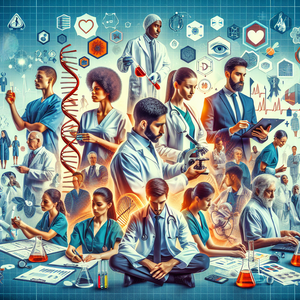
Discovering 15 Exciting Career Paths for Health Science Graduates: A Guide to Opportunities and Requirements
A degree in health science opens the door to a wide array of career options that blend healthcare knowledge with various professional aspirations. As the healthcare industry evolves, graduates find themselves well-prepared for roles that range from direct patient care to administrative, research, and technical positions. The rising demand for skilled health science professionals is driven by advancements in technology, an aging population, and an increased focus on public health initiatives.
Job Summaries:
Health Educator:
- Health educators are instrumental in designing and executing community health programs.
- They assess health needs and create educational materials.
- A bachelor's degree in health science or a related field is required.
- Strong communication skills and knowledge of health policies are essential.
- There is a growing emphasis on public health education.
- Job opportunities for health educators are abundant.
Medical Laboratory Technician:
- Medical laboratory technicians play a crucial role in performing diagnostic tests on patient samples.
- These tests are vital for clinical decision-making.
- Typically requiring an associate degree in medical technology.
- This position demands certification as well.
- The steady demand for these professionals underscores their importance in delivering accurate laboratory results.
Epidemiologist:
- Epidemiologists study health trends and disease causes.
- Analyzing data to recommend preventive measures.
- A master’s degree in public health or a related field is often essential.
- Strong analytical skills are required.
- This role is particularly vital during health crises.
- Opportunities are increasing, especially in public health agencies.
Biomedical Equipment Technician:
- Biomedical equipment technicians ensure the safe and effective functioning of medical devices.
- A background in biomedical engineering or a related field, paired with specialized training, is usually required.
- This role supports healthcare providers by maintaining critical equipment.
- Job listings reflect a steady need for technical expertise.
Clinical Research Coordinator:
- Clinical research coordinators oversee clinical trials, ensuring compliance with regulations and ethical standards.
- A bachelor’s degree in health science or life sciences is generally required, along with strong organizational skills.
- This role significantly contributes to medical research and improving patient care, with varied openings available in research institutions and healthcare organizations.
Public Health Specialist:
- Public health specialists focus on enhancing community health through education and policy development.
- Typically requiring a degree in public health or health science.
- This role involves analyzing health data to identify challenges and create strategic initiatives.
- As communities increasingly prioritize health equity, job opportunities in this field are on the rise.
Health Science Writer:
- Health science writers craft engaging content that translates complex health information for diverse audiences.
- A degree in health science, journalism, or communications is often necessary, along with strong writing skills.
- This role helps inform healthcare decisions and bridge the gap between science and the public, with increasing demand for skilled communicators.
Pharmacy Technician:
- Pharmacy technicians support pharmacists by dispensing medications and managing inventory.
- Typically requiring a high school diploma and completion of a pharmacy technician program.
- Many states also require certification.
- This essential role ensures patients receive necessary medications.
- There are plentiful job openings in pharmacies and healthcare facilities.
Community Health Worker:
- Community health workers act as vital links between healthcare providers and underserved populations.
- Facilitating access to services and health education.
- While a high school diploma may suffice, some positions require additional training.
- This role is crucial for improving health outcomes in communities.
- Opportunities are available, particularly within non-profit organizations.
Health Services Manager:
- Health services managers oversee the operations of healthcare facilities.
- They ensure efficient service delivery and regulatory compliance.
- A bachelor’s degree in health administration or a related field is typically required.
- Strong leadership skills are essential for this role.
- There is a robust demand for skilled administrators.
- Job listings for this role continue to grow.
Healthcare Data Analyst:
- Healthcare data analysts leverage statistical methods to analyze healthcare data.
- Enhancing patient outcomes and operational efficiency.
- A bachelor’s degree in health science, data science, or a related field is generally required.
- As the healthcare sector increasingly relies on data, current job openings reflect this growing trend.
Health Policy Analyst:
- Health policy analysts conduct research on healthcare policies.
- They provide recommendations for systemic improvements.
- A master’s degree in public health or health policy is often required.
- Strong analytical skills are necessary for this role.
- This role is vital for influencing effective healthcare policies.
- Opportunities are growing, particularly within government and advocacy organizations.
Occupational Health and Safety Specialist:
- Occupational health and safety specialists focus on creating safe working environments by identifying hazards and implementing safety programs.
- A bachelor’s degree in health science or occupational health is typically required, along with relevant certifications.
- This role is essential for preventing workplace injuries, with job openings available across various industries.
Medical and Health Services Manager:
- Medical and health services managers coordinate services within various healthcare settings.
- They manage budgets, staff, and compliance.
- A bachelor’s degree in health administration or a related field is generally required.
- The need for effective facility management drives a strong job market for this role.
Biostatistician:
- Biostatisticians apply statistical principles to public health and medical research data.
- A master’s degree in biostatistics or a related field is typically required.
- A solid foundation in mathematics is necessary.
- This role is crucial for advancing medical research through data insights.
- Job opportunities are on the rise in healthcare research.
Each of these careers plays a vital role in the healthcare system, showcasing the diverse opportunities available for health science graduates. For those seeking a fulfilling career in healthcare, exploring these pathways is a significant first step toward making a meaningful impact. By understanding the unique skills and educational requirements for these roles, graduates can navigate their career choices with greater clarity. For further information on job openings and career paths, consider exploring additional resources and professional networks.
Explore More Jobs

